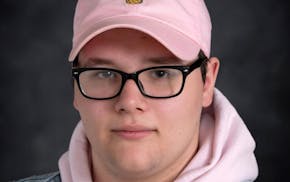Steve Couture hadn't expected to still be in the education game, having retired last year after a long career with the Minneapolis public schools.
He'd been a teacher, a prison tutor, a corporate manager and, in his last stop, principal of Anishinabe Academy. But he still had more to give. He applied for and landed the job of principal of St. Paul's American Indian Magnet School (AIMS) and now oversees a school with the language and cultural classes he says are key to engaging Indian youths.
At AIMS, Indian students make up just 23 percent of the population, but collectively, in St. Paul and nationwide, they are among the toughest to educate, with absenteeism a chronic problem. In 2011-12, Indian students posted the highest percentage among all St. Paul ethnic groups for missing 11 or more days of school.
To Couture, his life is a progression, with no eureka moments. And while he once was ready to step away, perhaps even to sell baseball bats at a sporting-goods store, he concluded that he still had something to offer those students: "All that experience has trained me to be here," Couture said last week.
Couture is 61, old enough to have heard his father speak Ojibwe with relatives, but a product of a time when few saw value in teaching a boy the language, too. Instead, "strive to be mainstream" was the unspoken message.
He was about 3 when his father, Leonard Couture, a World War II veteran, took a job driving a cement mixer and moved the family from Brookston, Minn., on the Fond du Lac Reservation, to the Piedmont Heights neighborhood of Duluth.
At Denfeld High, Couture was an average student and competed on the swim team. With a friend, Dean Johnson, he would camp along the St. Louis River near Brookston, where the iron ore trains rolled. Johnson, who died several years ago, "caught all the fish," Couture said.
To this day, he has no idea how fluent his father was in Ojibwe. "I'm like the football coach who didn't play football," he said. "But I appreciate it so much."
At the University of Wisconsin-Superior, Couture first thought of becoming a phy-ed teacher. But Duane Dunkley, then director of Indian education in Minneapolis, persuaded him to pursue a career there. At his first stop, Bryant Junior High, seven of the 1,000 kids were Indians, Couture recalled.
"I said, 'Mr. Dunkley, what's the deal?' He'd say, 'Hang in there, hang in there, it will work out.'"
Frustrated by layoffs, Couture returned to school at the University of Minnesota Duluth, where the experience of tutoring Indian inmates at Sandstone federal prison deepened his commitment to education. He returned to Minneapolis, but layoffs continued, prompting a move into the field of human resources management at Fortune 500 companies. Couture said some might view that as a "distraction," but it provided employee relations and leadership skills essential to his eventual work as a school administrator.
He was a principal at South and Washburn high schools, and closed out his Minneapolis career as principal at Anishinabe Academy. There, researchers found that weaving native values and language into a traditional curriculum had a positive effect on students' academic growth and focus.
After St. Paul decided to expand AIMS into a K-8 school and posted for a new principal, Couture applied. Steve Unowsky, St. Paul's assistant superintendent of middle schools, said they were thrilled to have him. Once on the job, Couture saw no need to put an imprint on the school's language and culture programs.
Meanwhile, the struggles of Indian students remain a concern, and they were the subject of a recent school board discussion during which Angie Thornhill, a parent committee co-chairwoman, singled out an AIMS program for praise. She said that her daughter was in the AVID program, which prepares minority students for college, and that it was "fantastic."
Couture plans to return to AIMS next year. The school needs balance, he said, in three areas: district curriculum and testing, native cultures and language, and social and emotional nurturing.
He is moving forward, he said, but proud to look back, too, on a career that in his view "fits together really nice."
Anthony Lonetree • 651-925-5036
Mother charged with fentanyl overdose death of her 8-month-old boy in Roseville hotel room

Dog returned safely to woman who had 'Tiny' stolen from her while on a walk in St. Paul 2 days ago

Prairie Island Indian Community requests the return of 'Mankato Hanging Rope'
